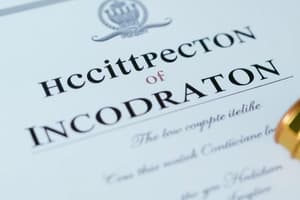Podcast
Questions and Answers
Why is incorporating as a C Corp often preferred when a business anticipates needing substantial capital?
Why is incorporating as a C Corp often preferred when a business anticipates needing substantial capital?
- C Corps allow for an unlimited number of shareholders.
- It avoids the need to have a board of directors.
- It simplifies the process of dissolving the company if it fails. (correct)
- C Corps have fewer regulations compared to other business entities.
In a C Corp, all shareholders must be at the same level, meaning they all carry the same stock class regardless of their investment amount.
In a C Corp, all shareholders must be at the same level, meaning they all carry the same stock class regardless of their investment amount.
False (B)
What is the primary advantage of establishing a corporation in terms of asset protection?
What is the primary advantage of establishing a corporation in terms of asset protection?
Separation between personal and business assets
Many venture-backed startups choose to incorporate as a C Corp in the state of ______.
Many venture-backed startups choose to incorporate as a C Corp in the state of ______.
Match the following terms with their descriptions related to corporate structure:
Match the following terms with their descriptions related to corporate structure:
What is the main role of the Secretary of State in the incorporation process?
What is the main role of the Secretary of State in the incorporation process?
A C Corp in Delaware must have at least five directors on its board.
A C Corp in Delaware must have at least five directors on its board.
What critical decision-making powers do directors of a corporation typically possess?
What critical decision-making powers do directors of a corporation typically possess?
The process by which founders and employees earn their shares over time, rather than receiving a massive allocation upfront, is known as ______.
The process by which founders and employees earn their shares over time, rather than receiving a massive allocation upfront, is known as ______.
What does a '1-year cliff' typically mean in the context of a vesting schedule?
What does a '1-year cliff' typically mean in the context of a vesting schedule?
Flashcards
C Corporation (C Corp)
C Corporation (C Corp)
Legal structure allowing unlimited shareholders and multiple stock classes.
Shareholders
Shareholders
Individuals or entities owning shares in a company, representing equity.
Common Stock
Common Stock
A class of stock that typically gives common voting rights and represents basic ownership.
Preferred Stock
Preferred Stock
Signup and view all the flashcards
Asset Separation
Asset Separation
Signup and view all the flashcards
Corporate Veil
Corporate Veil
Signup and view all the flashcards
Chancery Court
Chancery Court
Signup and view all the flashcards
Certificate of Incorporation
Certificate of Incorporation
Signup and view all the flashcards
Board of Directors
Board of Directors
Signup and view all the flashcards
Strike Price
Strike Price
Signup and view all the flashcards
Study Notes
- The text discusses the process of starting a company from the founder's perspective, focusing on incorporation and related decisions
- The main example uses the creation of a juice company to illustrate the various steps and considerations
Initial Considerations
- Starting a business involves numerous decisions, including selecting a business structure
- Raising capital is essential for businesses expecting significant growth
Incorporation Basics
- Incorporation involves creating a corporate shell for the business to operate within
- Several types of entity structures exist in the U.S., each with different tax implications, rules, and regulations
- Common entity types include sole proprietorships, partnerships, S corps, LLCs, and C corps
C Corporations
- C corps are often chosen when a business anticipates needing substantial capital
- C corps allow for an unlimited number of shareholders
- C corps can issue multiple stock classes
Shareholders
- Shareholders are individuals or entities that own shares in a company
- Shareholders in a C corp possess equity and can be international
Stock Classes
- Common stock is a typical class which investors can gain
- Preferred stock offers distinct advantages over common stock
Asset Separation
- C corps provide a clear separation between personal and business assets, offering a layer of protection against personal liability
Delaware C Corps
- Incorporating as a C corp in Delaware is a common practice, especially for venture-backed startups
- Delaware offers a business-friendly legal environment, a specialized chancery court system, and favorable tax advantages, such as no state corporate income tax (only franchise taxes)
- Forming a Delaware C Corp is simplified with services like Stripe Atlas
Incorporation Process
- The incorporation process involves filing a certificate of incorporation with the Delaware Secretary of State
- The state reviews, stamps, and certifies the document, confirming the company's incorporation
Board of Directors
- Delaware C corps must have at least one director
- The "action of incorporator" document establishes the corporate structure and appoints directors
- Directors hold significant power, approving major decisions such as compensation plans, company sales, and dissolutions
- The board can remove a founder if a majority votes in favor
Board Composition
- Startups often begin with co-founders on the board.
- Later, investors may gain a board seat when the company raises significant capital
Corporate Governance
- Corporate governance is a main aspect of being a Delaware company
- They also involve rules around board meetings, meeting minutes, and record-keeping
Stock Issuance
- After forming a C corp, the next step is to issue stock to shareholders
- Issuing stock defines ownership within the corporate entity
- Common stock is issued for insurance purposes
- Authorized and unissued shares are reserved for future use, such as hiring new employees
Stock Value
- Each share must have a price, typically referred to as par value
- A standard par value for initial common stock is $0.001 per share
- Founders must purchase their shares at the par value
83(b) Election
- Founders must file an 83(b) election with the IRS within 30 days of purchasing their shares
- It tells the IRS about the stock transaction and taxable income
- Failure to do so can result in unfavorable tax implications when selling shares later
Vesting
- Vesting is a mechanism to ensure that founders and employees earn their shares over time
- A vesting schedule protects the corporation and prevents early departures from devaluing the company
Vesting Schedule
- A standard vesting schedule is four years with a one-year cliff
- If someone leaves before the cliff, they get nothing
- After the cliff, shares vest quarterly or monthly
Stock Options vs. Founder Shares
- Employees typically receive stock options, which are the option to purchase shares at a later date
- Founders purchase their shares outright but are subject to a vesting schedule
Employee stock option plans (ESOPs_
- They are related to the "strike price"—it's really related to employee stock option plans (ESOPs)
- Third-party valuations determine a discounted price per share, benefiting employees
Exercising Options
- The investors valuation is lower to get a strike price for employees
- Employees has a set time after leaving the company to exercise their options, like a 90 window
Employer Identification Number (EIN)
- The final step in the incorporation process is obtaining an EIN or FEIN
- The EIN is a unique 9-digit code that identifies the company for tax purposes
- An EIN is necessary to hire employees, run payroll, open bank accounts, and pay taxes
Studying That Suits You
Use AI to generate personalized quizzes and flashcards to suit your learning preferences.



